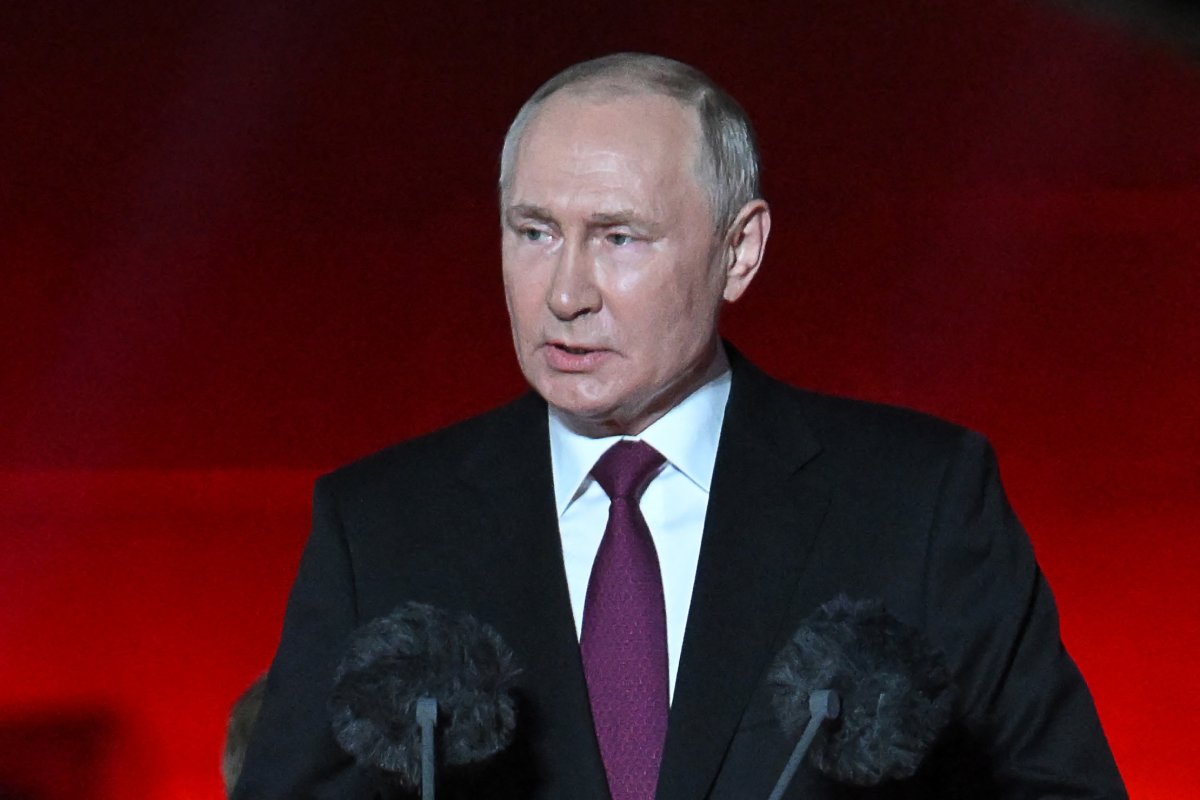A year ago, Russian President Vladimir Putin held a lavish gala concert to commemorate the 80th anniversary of the Battle of Kursk, which saw the Soviet army drive out Nazi Germany’s forces, hailing the feat as a turning point in World War II.
“The significance of the victory in this landmark battle cannot be overestimated: it destroyed and eliminated the striking power of the Nazis,” the Russian leader said in the village of Ponyri, Kursk, before he presented state awards to participants in his war in Ukraine.
This is definitely getting filed under ‘You can’t make this 💩 up’:
Tonight Ostankino TV tower in Moscow was illuminated in honor of the Battle of Kursk! Not the current one, but it’s funny under the circumstances.
“We Remember The Battle of Kursk” reads one of the slogans. 🤣… pic.twitter.com/d8x2K8VKQd
— Natalka (@NatalkaKyiv) August 23, 2024
Now, German military equipment is reported to be back in Russia as part of Ukraine’s surprise incursion into the Kursk region. It caught Putin’s military off-guard on August 6, and has resulted in Ukrainian forces seizing more territory than Russia has captured in Ukraine since the beginning of the year.
Newsweek has contacted Russia’s Defense Ministry for comment by email.
Germany’s Finance Minister Christian Lindner defended Ukraine’s ability to use German-supplied weapons on Russian soil. The newspaper Bild reported that a video from the Kursk region showed Kyiv’s forces using WiSENT 1 armored vehicles modeled on German-made Leopard 1 tanks.
Combat footage shared on Telegram channels also appears to show the destruction of Leopard 1 tanks in Kursk. German-supplied Marder infantry fighting vehicles have also been spotted in the region, Russian newspaper Rossiyskaya Gazeta reported.
The German government hasn’t officially confirmed the use of these weapons by Ukraine in its Kursk offensive.
“The weapons have become the responsibility of Ukraine, which is defending itself against an aggressor and exercising its right to self-defense,” Lindner told Schweizer Radio und Fernsehen (SRF), a Swiss broadcasting company, on August 17. He had been asked about reports that Ukrainian troops are fighting with German weapons on Russian soil.
“Those are Ukrainian weapons,” Wolfgang Büchner, spokesman of Germany’s Ministry of Defense, said during a press conference of the reports, DW reported, adding that Ukraine is “free to choose its options” for self-defense.
Walter Clemens, an associate at the Davis Center for Russian and Eurasian Studies at Harvard University, said Ukraine’s Kursk incursion “has demonstrated the fragility of Putin’s hold on power.”
“Things have been reversed at Kursk,” Clemens, author of Blood Debts: What Putin and Xi Owe Their Victims, told Newsweek.
“In 1943 the Red Army was working to expel from the Soviet Union a powerful invader, Hitler’s Wehrmacht, The tank battle at Kursk delivered a virtual death blow to German forces and pushed them into a long retreat that ended with the Red Army occupying Berlin,” Clemens said.
Now, 81 years later in Kursk, Russian forces are attempting to contain Ukraine’s advancing troops “determined to oust Vladimir Putin’s ‘special military operation’ from Ukrainian lands.”
Clemens added that, while Putin’s troops in the area may outnumber Ukraine’s, the Ukrainian morale is “far stronger” and some of their West-supplied weapons superior.

GAVRIIL GRIGOROV/POOL/AFP
Harry Bennett, associate professor in history at the University of Plymouth in the U.K., told Newsweek that, given Putin’s remarks on the 80th anniversary of the Battle of Kursk, the success of the Ukrainian incursion in the region “could be seen as an embarrassment.”
“But dictators rarely need to worry about being reminded of their words in front of domestic audiences,” said Bennett.
“More tellingly, and no matter how the domestic Russian media reports the success of the offensive, the loss of Russian territory, and the presence of hostile forces less than 300 miles from Moscow, tells its own story,” he added.
Ukrainian forces have seized control of 1,250 square kilometers (482 square miles) of Russian territory and 92 settlements, President Volodymyr Zelensky said Monday of the Kursk incursion’s progress.
Ukrainian presidential adviser Mykhailo Podolyak said on August 8 the armored assault aims to boost Kyiv’s position in potential future negotiations with Russia. He added Kyiv hopes Ukraine’s advances will “scare” Russians and worsen their attitude toward Putin.
Do you have a tip on a world news story that Newsweek should be covering? Do you have a question about the Russia-Ukraine war? Let us know via worldnews@newsweek.com.




